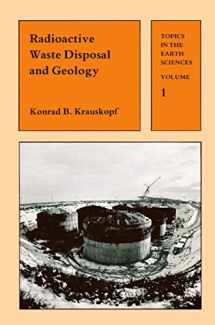
Radioactive Waste Disposal and Geology (Topics in the Earth Sciences)
Book details
Summary
Description
The perception of radioactive waste as a major problem for the industrial world has developed only recently. Four decades ago the disposal of such waste was regarded as a relatively minor matter. Those were the heady days when nuclear fission seemed the answer to the world's energy needs: the two wartime bombs had demonstrated its awesome power, and now it was to be harnessed for the production of electricity, the excavation of canals, even the running of cars and airplanes. In all applications of fission some waste containing radioactive elements would be generated of course, but it seemed only a trivial annoyance, a problem whose solution could be deferred until the more exciting challenges of constructing reactors and devising more efficient weapons had been mastered. So waste accumulated, some in tanks and some buried in shallow trenches. These were recognized as only temporary, makeshift measures, because it was known that the debris would be hazardous to its surroundings for many thousands of years and hence that more permanent disposal would someday be needed. The difficulty of accomplishing this more lasting disposal only gradually became apparent. The difficulty has been compounded by uncertainty about the physiological effects oflow-Ievel radiation, by the inadequacy of detailed knowledge about the behavior of engineered and geologic materials over long periods under unusual conditions, and by the sensitization of popular fears about radiation in all its forms following widely publicized reactor accidents and leaks from waste storage sites.


We would LOVE it if you could help us and other readers by reviewing the book
Book review



